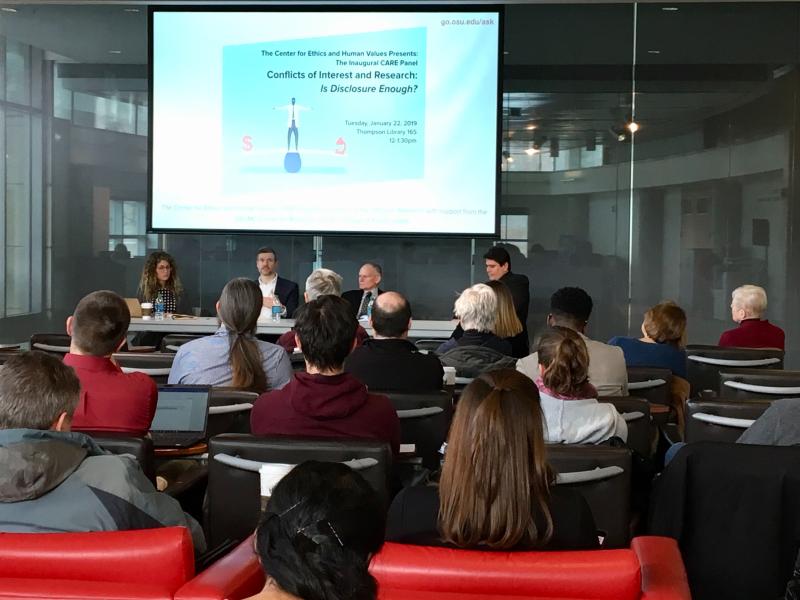CARE: Conversations About Research Ethics

About the CARE Program
The Center for Ethics and Human Values’ CARE (Conversations About Research Ethics) program aims to support Ohio State’s Shared Values in the domain of research by building a community around discussions of research integrity. CARE is distinctive by promoting multidisciplinary and foundational discussion of ethical issues arising from research practice, often bringing together natural and social scientists with researchers from more humanistic disciplines. Complementary to compliance-focused trainings, the program encourages exploratory discussion of cutting-edge issues in an evolving field.
The program has two arms:
- CARE Panels
- Monthly discussion panels with external speakers and experienced Ohio State researchers
- CARE Training Program
- A semester-long training program in the responsible conduct of research for investigators seeking to meet federal ethics guidelines
CARE is led by Prof. Dana Howard (Division of Bioethics, COM; Philosophy, ASC), a member of CEHV's steering committee.
Spring 2025 CARE Panels
Intimacy, Vulnerability, and Risks of Harm in Research
Monday, January 26th | 12pm -1:15pm | Virtually on Zoom
Working with What’s Missing: Ethical Strategies for Incomplete Data
Monday, February 9th | 12pm -1:15pm | Virtually on Zoom
Collaborating with Non-Academic Organizations
Monday, March 23rd | 12pm -1:15pm | Virtually on Zoom
Why Ohio State needs CARE
The aim of CARE is to build a community around research integrity at Ohio State that goes beyond formal requirements for human subjects protection and the responsible conduct of research.
When thinking about the ethical challenges that arise in academic research, we often conjure up one of two extreme images: (i) detailed, compliance-oriented feedback from institutional review boards or (ii) newspaper headlines that call attention to disgraced scientists, falsified data, and retracted articles. Missing from this binary picture are the complex and difficult ethical dilemmas and challenges that researchers face every day.
Researchers motivated by the scientific and social value of their work to responsibly design and conduct their research often face pressing and complex ethical challenges in the field or in the lab. These ethical challenges arise out of the persistent social inequities that create vulnerable populations, and from the demands of current funding structures, publishing practices, and norms of professional advancement. They do not merely bear on the question of what is formally allowed—the questions that federal regulations and institutional oversight committees are designed to enforce—but rather on questions about what is the right thing to do.
Subscribe for Updates
To stay informed about CARE, subscribe to our mailing list.

